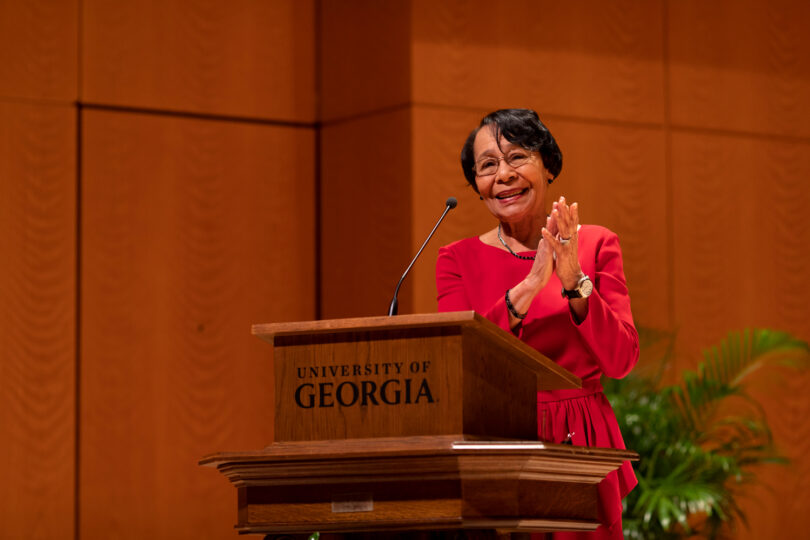For two decades now, the University of Georgia has hosted the annual Mary Frances Early Lecture Series. Speakers such as Ambassador Andrew Young, Rep. John Lewis, and Surgeon General Joycelyn Elders delivered messages that honor the determination and dignity that has defined the life of Mary Frances Early MMEd ’62, EdS ’67.
Back in 2000, Early herself gave the inaugural speech when the series was known as the Graduate and Professional Scholars spring lecture. It was named in her honor following that address. For the 20th anniversary, on Feb. 25, Early was back on stage to take part. But this was hardly a standard university event. The keynote lecture by Marion Fedrick BSEd ’94, MPA ’02, president of Albany State University, and the ceremonies surrounding it marked the naming of UGA’s College of Education in honor of Early.
It was the most important step in a long journey by the UGA community to honor Early. Her hard work, selflessness, and sacrifice went unacknowledged for more than 30 years but now serve as a shining light of inspiration for all.
A Quiet Trailblazer
In 1961, Charlayne Hunter ABJ ’63 (later Hunter-Gault) and Hamilton Holmes BS ’63 entered the University of Georgia as the university’s first African American students. Early, a graduate student in music education at the University of Michigan, watched them from afar. The Atlanta native knew Hunter and Holmes personally, though. They had all graduated from Turner High School; Early was five years ahead of the pair, but she met them while student teaching.
Early, who earned her undergraduate degree at Atlanta’s Clark College (now Clark Atlanta University) was already an elementary school music teacher when she entered graduate school at Michigan. She excelled there and was well on her way to receiving her master’s degree. Still, when she saw the riots that greeted Hunter and Holmes in Athens, Early made a life-changing decision. She applied to the Graduate School at UGA.
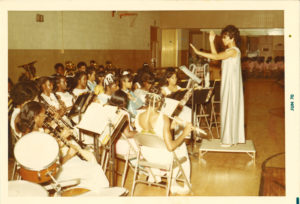
Mary Frances Early taught music in the Atlanta Public Schools system for 37 years and eventually led the music program for the entire system.
“My mom wasn’t very happy about it, but she supported me,” Early said. “I felt I needed to open the doors of the grad school. I wanted to do something instead of just stand on the sidelines. You have to be an activist if you want to see change made. I was a very quiet person, an unlikely person to integrate UGA. But having grown up during a time when everything was separate but not equal—I was tired of that.”
Early was accepted as a student in the institution but not so much as a member of the community. After coming to UGA in the summer of 1961, a few months after Holmes and Hunter, Early experienced a lot of the same horrible treatment they did.
Rocks smashed through her Myers Hall dorm window. Students blocked her entry into the library. She was once even pelted with lemons in the dining hall. (She threw some of them back.)
But Early found support, too. Her music education professors didn’t treat her any differently than they did the other students. Some fellow students became friends, although Early’s loneliness was palpable. Still, she excelled in the classroom, as she always did. When she graduated with her master’s in music education in 1962, more than 70 members of her family and friends attended the ceremony.
Despite the challenges she faced on campus, Early returned to UGA in 1964 to begin classwork for her educational specialist degree, which she received in 1967. After that, she devoted her time to teaching and promoting music education. As a panelist for the National Endowment for the Arts, Early determined grants for musical organizations across the country for 11 years. She also helped write the Macmillan/McGraw-Hill music textbook series, leaving a lasting imprint of her ideas in the classroom.
I felt I needed to open the doors of the grad school. I wanted to do something instead of just stand on the sidelines. You have to be an activist if you want to see change made. I was a very quiet person, an unlikely person to integrate UGA. But having grown up during a time when everything was separate but not equal—I was tired of that. — Mary Frances Early MMEd ’62, EdS ’67
But her passion was always with her students. In all, Early spent 37 years teaching in the Atlanta Public Schools, eventually rising to lead the music program for the entire system. After she retired in 1994, she joined the music faculty at Morehouse and Spelman colleges and also chaired the music department at Clark Atlanta University. Regarding the University of Georgia, Early didn’t look back. When she graduated in 1962, there had been no recognition of her accomplishment—beyond her diploma. And there wouldn’t be for decades. Early never sought the attention.
The attention found her. By accident.
An Incredible Reunion
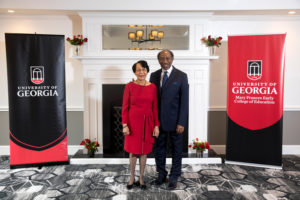
Through his research that identified Mary Frances Early at UGA’s first African American graduate, Maurice Daniels played an integral role in reuniting Early with UGA. They have remained friends for more than 20 years. (Photo by Dorothy Kozlowski/UGA)
Maurice Daniels, then a professor in the UGA School of Social Work, uncovered Early’s story while researching another topic. After meeting, Early was invited back to campus with open arms. She happily returned.
The Graduate School’s lecture series is just one of the many ties between Early and UGA. She has served on several alumni and leadership boards, and an endowed professorship and a scholarship were created in her name. She delivered the 2007 graduate Commencement address; in 2013, she received her third UGA degree, an honorary Doctor of Laws. Fewer than 100 honorary degrees have been bestowed since the university’s founding.
In 2018, Early received the President’s Medal, and her portrait was unveiled in the Administration Building. But all that was just an opening act for the finale on Feb. 25.
Maurice Daniels
If not for the efforts of one UGA dean and professor, Mary Frances Early might not have a relationship with the University of Georgia, much less a college named in her honor.
In 1997, Maurice Daniels, a civil rights scholar who would eventually become dean of the School of Social Work, was
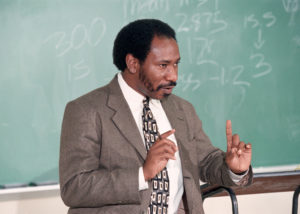
Maurice Daniels in 1997, the year he learned Mary Frances Early’s story. He would eventually become dean of the School of Social Work. (Photo by Paul Efland)
researching a book about the desegregation of the university. During his conversations with the movement’s leaders, Early’s name came up. Daniels wasn’t familiar with her accomplishments, so he did some more digging and confirmed that she was the university’s first African American graduate. He reached out to her and, for the first time, detailed her story.
Things moved quickly from there. A student group invited Early to speak on campus. Then, as a result of Daniels’s work, UGA’s president Michael Adams released a proclamation formally acknowledging Early as the university’s first African American graduate. Those were the first steps in repairing a relationship that had lain dormant for far too long.
Following their original 1997 meeting, Early and Daniels remained close. In 2009, Daniels delivered that year’s Mary Frances Early Lecture. And in 2018, he served as co-executive producer of the documentary Mary Frances Early: The Quiet Trailblazer, which premiered on Georgia Public Broadcasting.
A Celebration for All Time
The process to name the College of Education for Early took about 10 months.
In April 2019, the college launched a fundraising initiative to name it in Early’s honor. Some $2.94 million has been raised since the effort began. In October 2019, the Board of Regents approved the naming with the official dedication scheduled for the following February.
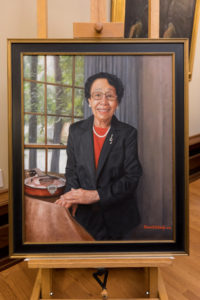
This portrait of Mary Frances Early is displayed in the Administration Building. (Photo by Andrew Davis Tucker/UGA)
In his opening remarks as the event’s emcee, President Jere W. Morehead JD ’80 described Early as a pioneering educator and civil rights icon. He also provided some important context. “With her historic legacy, it is fitting that Ms. Early is making history once again as the first African American to have a college or school named after them at the University of Georgia,” he said.
Albany State University President Marion Fedrick, like Early, earned two degrees at UGA, then proved to be the ideal keynote speaker.
“Mary Frances Early lifted a whole generation with her actions,” Fedrick said. “She made sure that all of us could attend UGA—and not just UGA, but any other school that had yet to be desegregated. There were generations of students, not just the students from 1961, but students from that day forward who benefited from the sacrifices she made.”
Early spoke briefly—just seven minutes—to cap the ceremony. As always, her words carried weight.
“We have choices to make, and I want you to know that when I chose to join my fellow Turner High graduates, I wasn’t trying to be the first to get a degree,” Early said, subtly noting that Holmes and Hunter graduated from Turner High just like she did, albeit five years after. “They had opened the door for undergraduates. I wanted to open the door at the University of Georgia for graduate students like me. I had to make a contribution to help make our nation better, our state better. The thing I knew I could do was go to school. So I did.”
When I chose to join my fellow Turner High graduates, I wasn’t trying to be the first to get a degree. They had opened the door for undergraduates. I wanted to open the door at the University of Georgia for graduate students like me. I had to make a contribution to help make our nation better, our state better. The thing I knew I could do was go to school. So I did. — Mary Frances Early MMEd ’62, EdS ’67
Early spoke further about the importance of education, teaching, and courage. She acknowledged the difficulty of her student experience, but the biggest theme of the day was gratitude. Gratitude from the University of Georgia to one of its most important alumni. And gratitude from the diverse multitudes in attendance—friends from Turner High, the governor and first lady, members of the Board of Regents, and even students from the Mary Frances Early College of Education who wanted to pay their respects and also to be part of history. All of them honoring the remarkable woman on stage.
“It warms my heart to hear people say thanks for paving the way,” Early said. “That’s the best thing anyone can say to me.”
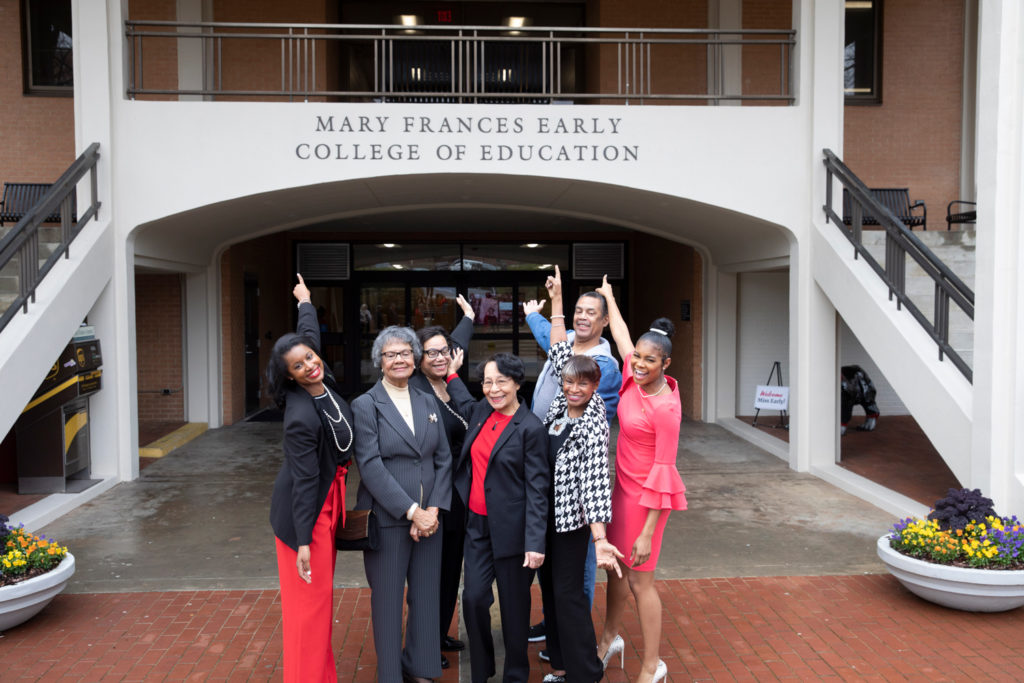
Mary Frances Early celebrates with family and friends following the College of Education naming ceremony. (Photo by Peter Frey/UGA)


